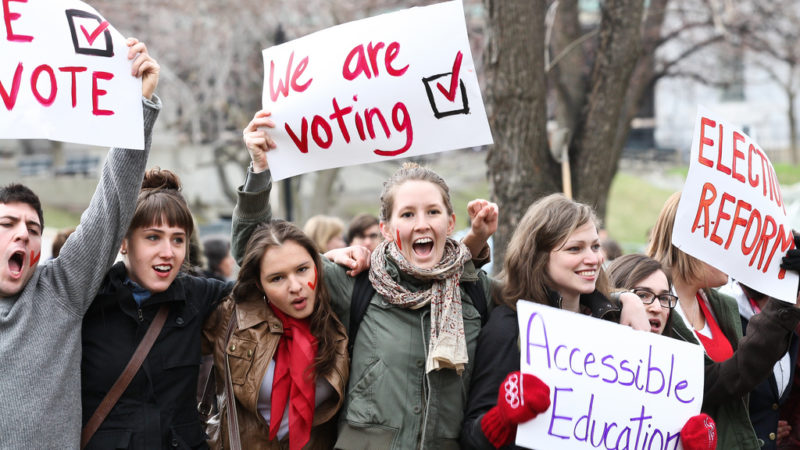A bill being heard in the House of Commons tomorrow could be the first step in allowing 1.5 million teens to vote.

A bill to reduce the voting age to 16 will have its second reading in the House of Commons tomorrow – but whatever the outcome, campaigners say they’re “in it for the long haul”.
The British Youth Council (BYC) said it had been campaigning on the issue for 18 years — with the Votes at 16 Commission formed to lobby for change 16 years ago — and it will keep campaigning for as long as necessary.
Labour MP Jim McMahon is spearheading the Private Member’s Bill, which could be a first step on a long road towards giving 1.5 million teens a say in the next election.
Proponents say the change is long overdue and would be an immensely positive way to improve British democracy.
But although the Bill has cross party support — with the Scottish Tories particularly keen to lower the voting age — the Prime Minister is expected to block the change, having said in July: “We expect people to continue in education or training until the age of 18, and I think that is the right point for the voting age”. Never mind the fact 16 and 17-year-olds can work like anyone else— albeit for a lower minimum wage — and are expected to pay tax on their earnings.
But the BYC say they feel positive about tomorrow’s vote, and that isn’t contingent on any one outcome.
A spokeswoman told Left Foot Forward:
“Every time we see decision makers use the platform and mechanism available to them to progress our campaign that’s a positive thing.”
She added:
“Success for us would obviously be for the enfranchisement to be changed, but the fact that over 150 MPs have been meaningfully engaged and they have been proactive through the actions of young people at local level lobbying their MPs… is positive for the campaign.”
The vote has put the issue back into public discourse, the organisation said, and started a new conversation around democracy and the rights and responsibilities of young people.
McMahon, who told the Mirror on Tuesday he was pleased with the response to the Bill.
He said:
“…Now the time has come to make this a reality.
“If we want to have discussions about civic engagement and educating a new generation in the importance of being politically aware, then empowering young people to vote is the springboard we need.
“Above all, it’s the right thing to do if we care about strengthening our democracy.”
In addition to the BYC, the National Union of Students and the Electoral Reform Society are supporting the Bill, with proponents pointing out that if 16-year-olds can join the army and get married, they should be allowed to participate in democracy.
It’s likely Theresa May is particularly resistant to the change because few 16 and 17-year-olds are likely to vote Conservative: Labour’s unexpectedly high share of the ballot in June’s general election was attributed to a large youth turnout and Tory efforts to engage more young people since the election have mostly failed, often ending in embarrassment for the party.
Charlotte England is a freelance journalist and writer at Left Foot Forward. Follow her on Twitter.
Left Foot Forward doesn't have the backing of big business or billionaires. We rely on the kind and generous support of ordinary people like you.
You can support hard-hitting journalism that holds the right to account, provides a forum for debate among progressives, and covers the stories the rest of the media ignore. Donate today.




6 Responses to “Votes at 16: ‘Either way, we win’, say campaigners”
James Cathcart
Will Left Foot Forward or Charlotte be reporting on covering the debate in the House of Commons by young people of the UK Youth Parliament on 10th November. Nearly a million young people voted to choose five topics for debate and vote to be their campaign for 2018. One is Votes at 16. In contrast to the Commons debate and no vote last Friday, the young parliament is polite, well prepared and wont talk out the motion. There are very diverse, unlike MPS, with gender equality and above average minorities and faith representation, and despite the myth that they are the politics students and usual suspects, their data shows they representation all background from the five groups in the DCLG index of deprivation. I wonder if they will bring fresh energy to the debate and get some positive reporting . Their average age is 16-17.